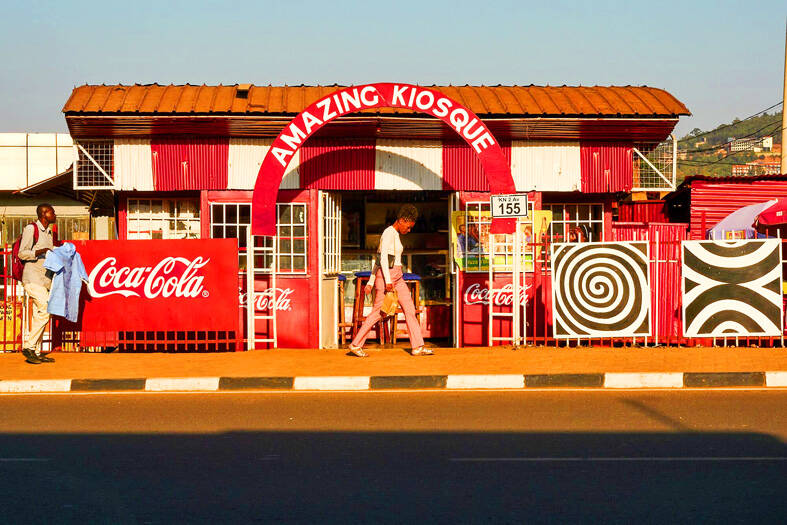A 200-year-old Tutsi art form made with cow dung, Rwanda’s imigongo painting tradition has experienced a revival in the Great Lakes nation three decades after the 1994 genocide, becoming a symbol of culture and unity.
Known for its raised black and white patterns, imigongo is widely believed to have been invented by a Tutsi prince in the 19th century.
Prince Kakira mixed cow dung and ash to create a material that he used to paint three-dimensional patterns on the walls of his palace in eastern Rwanda’s Gisaka kingdom.

Photo: Bloomberg
The tradition was named after “umugongo,” the Kinyarwanda word for “spine,” owing to its curved lines, and became popular among rural households where women would use dung and natural pigments made with soil, clay and aloe sap to decorate their homes.
Basirice Uwamariya, founder of the Kakira Imigongo Cooperative in eastern Kirehe District, said she started making art when she was 15.
However, the 1994 genocide targeting the Tutsi minority nearly wiped out the tradition, with almost all 15 members of Uwamariya’s cooperative killed in a bloodbath that claimed about 800,000 lives across Rwanda, including moderate Hutus.
She lost her husband and multiple relatives, leaving her to fend for herself and her two sons.
“I lived in darkness, in silence,” the 53-year-old said, recalling the loneliness that pushed her to revive the cooperative in 1996 and invite other genocide survivors to join her.
Since then, imigongo has evolved. Traditional patterns exist side by side with modern designs featuring various colors. Natural pigments have been replaced by commercial paints. Imigongo designs have made their way to upmarket studios and fashion boutiques, adorning garments and wooden artefacts alike, with a market that includes foreigners and Rwandans.
Theoneste Nizeyimana, manager of Azizi Life Studio in the capital, Kigali, said the tradition was once largely limited to eastern Rwanda.
“But after the genocide destroyed everything ... people started thinking about how they can bring back their culture. Today, imigongo is appreciated by all Rwandans, not just Tutsi,” he said.
“Imigongo is something that brings people together,” he said, pointing out that the Kigali boutique and studio holds painting classes for students whose ages range from four to 75 years old.
It also makes business sense, with its instantly recognizable patterns helping to market “made in Rwanda” designs around the world, he said.

REVENGE: Trump said he had the support of the Syrian government for the strikes, which took place in response to an Islamic State attack on US soldiers last week The US launched large-scale airstrikes on more than 70 targets across Syria, the Pentagon said on Friday, fulfilling US President Donald Trump’s vow to strike back after the killing of two US soldiers. “This is not the beginning of a war — it is a declaration of vengeance,” US Secretary of Defense Pete Hegseth wrote on social media. “Today, we hunted and we killed our enemies. Lots of them. And we will continue.” The US Central Command said that fighter jets, attack helicopters and artillery targeted ISIS infrastructure and weapon sites. “All terrorists who are evil enough to attack Americans are hereby warned

The death of a former head of China’s one-child policy has been met not by tributes, but by castigation of the abandoned policy on social media this week. State media praised Peng Peiyun (彭珮雲), former head of China’s National Family Planning Commission from 1988 to 1998, as “an outstanding leader” in her work related to women and children. The reaction on Chinese social media to Peng’s death in Beijing on Sunday, just shy of her 96th birthday, was less positive. “Those children who were lost, naked, are waiting for you over there” in the afterlife, one person posted on China’s Sina Weibo platform. China’s

‘POLITICAL LOYALTY’: The move breaks with decades of precedent among US administrations, which have tended to leave career ambassadors in their posts US President Donald Trump’s administration has ordered dozens of US ambassadors to step down, people familiar with the matter said, a precedent-breaking recall that would leave embassies abroad without US Senate-confirmed leadership. The envoys, career diplomats who were almost all named to their jobs under former US president Joe Biden, were told over the phone in the past few days they needed to depart in the next few weeks, the people said. They would not be fired, but finding new roles would be a challenge given that many are far along in their careers and opportunities for senior diplomats can

Seven wild Asiatic elephants were killed and a calf was injured when a high-speed passenger train collided with a herd crossing the tracks in India’s northeastern state of Assam early yesterday, local authorities said. The train driver spotted the herd of about 100 elephants and used the emergency brakes, but the train still hit some of the animals, Indian Railways spokesman Kapinjal Kishore Sharma told reporters. Five train coaches and the engine derailed following the impact, but there were no human casualties, Sharma said. Veterinarians carried out autopsies on the dead elephants, which were to be buried later in the day. The accident site